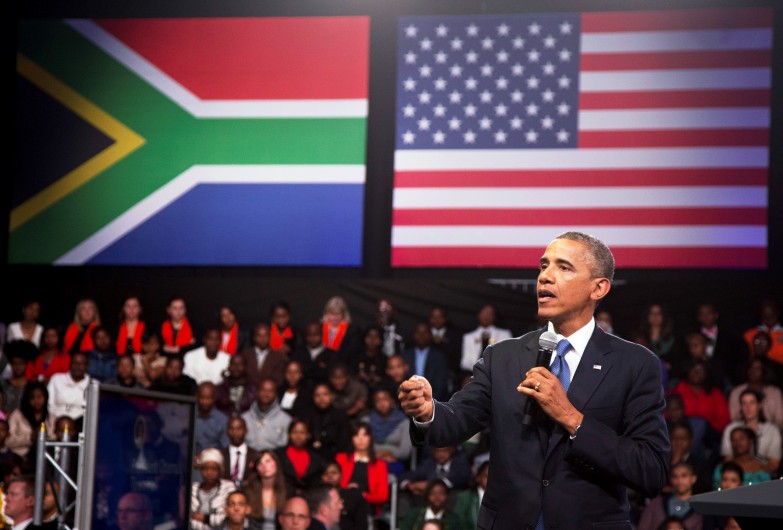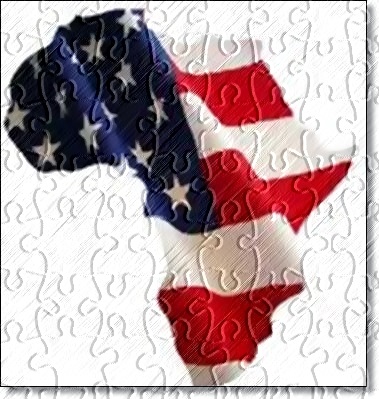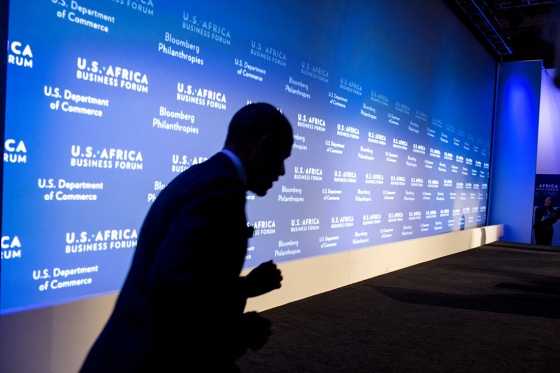The African leaders at the first-ever US-Africa Leaders Summit in Washington last week presented an upbeat image of an African continent ready to do business. But can business lead, or does the vision and direction for decent, if not good societies need to come from elsewhere?
 There was a joke amongst the attendees: China invests money; America holds receptions. Just since 2001, total Chinese trade with Africa has increased twentyfold!
There was a joke amongst the attendees: China invests money; America holds receptions. Just since 2001, total Chinese trade with Africa has increased twentyfold!
President Obama’s timing for the summit could not have been worse. The backdrop of the Ebola outbreak in West Africa meant that the PR campaign fell on deaf ears in the United States, despite promises of billions of dollars in investments by American fat cats.
As Helen Epstein wrote in a piece entitled, “Africa’s Slide Toward Disaster,” The summit sought to highlight Africa’s development successes and promote trade and investment on a continent rich in oil and natural resources. Justice and the rule of law weren’t on the agenda.”
Though Barack sounded his sonorous best, the Ebola noise in the media drowned out Washington’s made-in-Hollywood musical. Indeed, the summit had the ring of musical chairs about it for everyone concerned, including the USA.
If there was a theme, it was that the perception of Africa is out of sync with the reality of Africa. Tanzania’s president, Jakaya Mrisho Kikwete correctly noted that though his country is in East Africa, too often “the whole of the African continent is perceived as if everywhere, everybody is suffering from Ebola.”
The African leaders however, following the American model, believe that the problem is primarily, if not solely with the perception not the reality of Africa. That kind of thinking has reached its logical conclusion in the United States, where most people believe there is no reality, only perception.
Pushing the Summit’s theme of perception trumping reality too far, President Kikwete played down the threat posed by militants, saying that Africa’s two major trouble spots, Somalia and Darfur, Sudan, had calmed down. That drew a sharp rejoinder from President Moncef Marzouki of Tunisia, who cited continuing violence in Sudan and northern Mali. “We have to face the problems, but we have to work together,” said President Marzouki.
The Obama Administration had two aims with the US-Africa Leaders Summit—to “change the narrative” about Africa and open the Continent to American business; and to provide an alternative to China’s extractive, no-strings-attached model. “We don’t look to Africa simply for its natural resources. We recognize Africa for its greatest resource which is its people and its talents and its potential,” President Obama intoned unconvincingly.
Helen Epstein hit the nail on the head: “By lavishing billions of dollars in military and development aid on African states while failing to promote justice, democracy and the rule of law, American policies have fostered a culture of abuse and rebellion. This must change before the continent is so steeped in blood that there’s no way back.”
The choice between the Chinese model and the American model is no choice at all. The increasingly discordant duopoly of global capitalism was chartered in the USA, and adopted and adapted in the last quarter-century to exquisitely ironic effect by the communist government of the People’s Republic of China.
China supposedly puts the interests of the community first, and America supposedly puts individual freedom first. But on the  ground there’s not a dime’s worth of difference between them. Both have produced remote, corrupt governments presiding over individualism run amok.
ground there’s not a dime’s worth of difference between them. Both have produced remote, corrupt governments presiding over individualism run amok.
African leaders have been making one Faustian bargain after another with China, which agrees to turn a blind eye to Africa’s governance and human rights issues. All Africans have to do is turn a deaf ear to the sound of the huge vacuum cleaner sucking every resource the PRC can out of the Continent.
Not that America’s deal is any better. “I want Africans buying more American products; I want Americans buying more African products,” President Obama said. But good consumers, as we have learned in America, make bad citizens when consumption is put first.
It’s a hoot to hear American conservatives squeal about the rise of autocratic regimes like China’s, based on centralized authoritarian capitalism, instead of what’s left of the decentralized liberal capitalism that built this country, when these same conservatives have decried liberalism to the point of making the very word unutterable in American politics.
What was missing from the gathering was any talk of vision for Africa by Africans, though a few leaders hinted at one. For example, President Macky Sall of Senegal, referring to Western news reports about the outbreak, said, “Ebola is not an African disease. It is necessary to confront Ebola as a threat to humanity.”
That points in the right direction, but one huge contradiction needs to be resolved. Over and over again one heard the refrain, ‘Africa is 53 separate, sovereign countries.’ Yes, and that’s precisely the problem, with Africa and the world.
Regional trading blocs like the East African Community are moving in the right direction, but people at all levels need to think in terms of greater integration if Africa is not to develop along extractive and consumeristic lines, and continue to get the worst of both.
Bottom line? Whether it’s the Chinese or American model, when the profit motive rules, you end up substituting one form of tyranny for another.
As Tunisia’s president, Moncef Marzouki, the clearest and most forceful of the leaders said, “I must stress we don’t need development which is not useful for the population. We don’t want to widen the gap between rich and poor because this will lead to more instability and more pressure and more civil war.”
Africa is poised to transition from aid and dependency to trade and investment. What’s needed are a few leaders of Julius Nyerere’s caliber, without the socialist ideology but with a capacity to inspire people and manipulate the markets to the benefit of Africans and humanity.
Fittingly Africa, the birthplace of man, is the theatre in which the last act of humankind, at least for the foreseeable future, will be played out. Can Africans rise to the challenge? Yes we can.
Martin LeFevre

